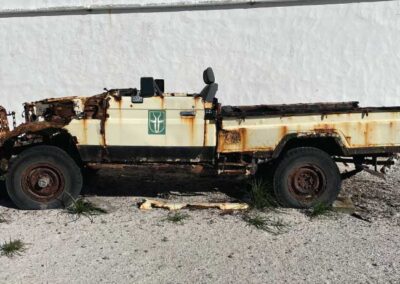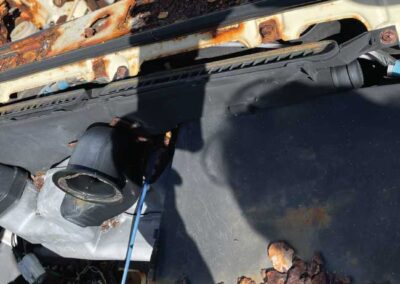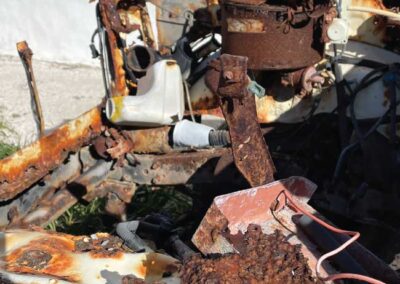Word from the CEO
Yolan Friedmann
Sometimes we need to be reminded of what we know. We need this a lot. Since the discovery of PVC – the world’s third-most widely produced synthetic polymer of plastic – in 1876 and its development into a plastic compound ready for use in pipes, bottles, packaging, medical devices, cards and with wide application in building and construction industries in around 1926, PVC accounts for about 43 million metric tons of the total 390 million metric tons of plastic produced every year. This number may be a small (ish) fraction. Still, the trouble with PVC is that it is not biodegradable, which means that PVC waste can remain in the environment for hundreds of years, causing significant harm to wildlife and ecosystems. The manufacturing process of PVC is harmful, using toxic chemicals like chlorine and dioxin. But its real danger lies in the fact that it never ever breaks down, and even when disposed of, the harmful chemicals can still leach into water and soil systems, killing millions of organisms.
I was reminded of this stark reality on a recent trip to an island on South Africa’s west coast. Over a few decades, the sea air had taken its toll on an old pickup truck on the island and made for a fascinating photograph of how metal, paint, and iron can eventually succumb to the ravages of nature’s demolishers in the form of wind, salt, air, and water. However, lying next to what was once the car’s engine was an almost perfectly preserved, ready-to-reuse PVC water tank. Furthermore, the car’s dashboard was also almost reusable – black, shiny, and ready to go and the rubber linings were still in good nick. One may argue that this is why nearly non-destructible materials are used, as cars must be robust and safe. But the stark reality is that humans are creating toxic materials to last, which may put our futures at risk.
It is widely known that plastic, in its various forms, can be found in every ecosystem, on every surface and in every corner of the planet. To all depths of every ocean and river, in our air, forests, grasslands, and mountains, and eventually into our food and water. It leaches toxins and strangles wildlife; it chokes waterways and animals. Microplastics negatively affect all life, humans included. Yet we keep manufacturing them; worse, we keep discarding them recklessly and frivolously, as if they were leaves on the wind.
Every single human being has a role to play here. We all need to buy less plastic, use less plastic, demand less plastic, and, most important, discard it responsibly. We also ALL need to pick it up wherever we go, take (recyclable) bags with us when we walk in parks, on our beaches, through our forests, when you walk the dog and run with mates, go for a ride and paddle on our dams. Please pick it up, pick it up, and pick it up. Remove as much plastic from the environment as possible, and never ever walk over that bottle top or plastic wrapper again. That one action of NOT picking it up can lead to the direct death of an insect, a bird, a seabird or a fish. The many actions of NOT picking it all up will almost certainly lead to the end of life on earth for many species and what we need it to be for all life.
Let’s all play our part and Pick It Up. Saving one life at a time
To help us celebrate 50 Years of Conservation in Action, send us your thoughts on #50YearsOfEWT to help us create the next 50. Like the Marula, the EWT is here to serve our environment and has thousands more sunsets to share and sunrises to welcome. Help us craft #TheNext50 together.
Drop us a line at ewt@ewt.org.za or visit www.ewt.org.za, where you can share your vision for our planet 2073 and what the EWT will have achieved by then.
To help us celebrate 50 Years of Conservation in Action, send us your thoughts on #50YearsOfEWT to help us create the next 50. Like the Marula, the EWT is here to serve our environment and has thousands more sunsets to share and sunrises to welcome. Help us craft #TheNext50 together.
Drop us a line at ewt@ewt.org.za or visit www.ewt.org.za, where you can share your vision for our planet 2073 and what the EWT will have achieved by then.
Happy Birthday, EWT.
Yolan Friedmann



